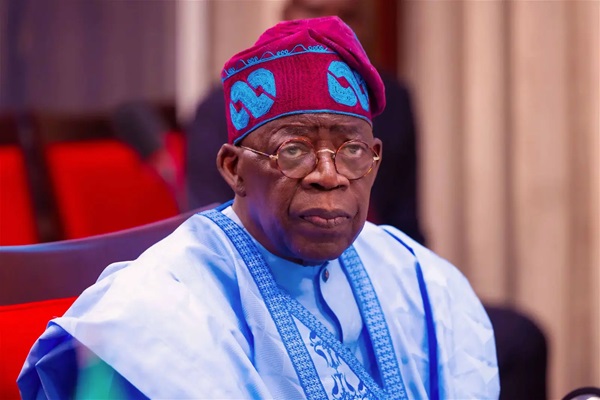-
Tinubu’s Govt Dragged To Court Over Failure To Account For Loans By Ex-presidents by SERAP.
-
Lawsuit seeks to compel disclosure of loan agreements and spending particulars, emphasizing transparency and accountability in public spending.
-
Transparency in government finances essential for democratic governance, citizens’ right to information crucial for assessing government performance.
EKO HOT BLOG reports that Socio-Economic Rights and Accountability Project (SERAP) has initiated legal action against the government of President Bola Tinubu for its failure to disclose spending details of loans acquired by past administrations, including those of former presidents Olusegun Obasanjo, Umaru Musa Yar’Adua, Goodluck Jonathan, and Muhammadu Buhari.
The lawsuit, filed against Minister of Finance and Coordinating Minister of the Economy, Mr. Wale Edun, and the Debt Management Office (DMO), seeks to compel the Tinubu government to publish the loan agreements and spending particulars of the mentioned administrations.
EDITOR’S PICK
- Pay ₦60,000 Minimum Wage Or Resign- Labour Tells Governors
- Fresh Jobs Coming As Nine Ministries Prepare For Proposals Submission
- Rivers APC Backs Fubara As Unopposed 2027 Gubernatorial Candidate
SERAP contends that transparency in public spending is essential for accountability and democratic governance, emphasizing citizens’ right to access information about government finances to assess its performance and effectiveness.
The organization argues that secrecy surrounding the utilization of public funds undermines democracy and that citizens deserve transparency to evaluate their government’s stewardship.
SERAP contends that access to information on government spending can shed light on why millions of Nigerians still grapple with poverty and lack of basic services, despite significant loans acquired by past administrations.
The organization underscores Nigerians’ right to democratic governance, emphasizing their role in influencing government direction and assessing its performance.
Furthermore, SERAP emphasizes that government accountability to the public is fundamental to achieving democratic governance.
In the lawsuit, SERAP’s lawyers argue that disclosing loan agreements would enhance transparency and public accountability across government ministries, departments, and agencies (MDAs).
“Nigerians are entitled to information about what their government is doing in their name. This is part of their right to information.”
“Publishing the agreements and spending details would allow the public to see how and on what these governments spent the loans and foster transparency and accountability.”
“Publishing the loan agreements signed by the governments of former presidents Olusegun Obasanjo, Umaru Musa Yar’Adua, Goodluck Jonathan and Muhammadu Buhari, and widely publishing the agreements would allow Nigerians to scrutinise it and to demand accountability for the spending of the loans.”
“According to Nigeria’s Debt Management Office, the total public domestic debt portfolio for the country’s is N97.3 trillion ($108 billion). The Federal Government’s debt is N87.3 trillion ($97 billion).”
“Nigeria paid $6.2 billion in 2019 as interest on loans while the country paid $6.5 as interest in 2018. Nigeria also paid $5 billion as interest on loans in 2017 while the country paid $4.4 billion as interest in 2016. For 2015, the interest paid on loans was $5.5 billion.”
“Substantial parts of the loans obtained by successive governments since the return of democracy in 1999 may have been mismanaged, diverted or stolen, and in any case remain unaccounted for.”
“Persons with public responsibilities ought to be answerable to the people for the performance of their duties including the management of the loans obtained between May 1999 and May 2023.”
“The Tinubu government has a responsibility to ensure transparency and accountability in how any loans obtained by the Federal Government are spent, to reduce vulnerability to corruption and mismanagement.”

“The Freedom of Information Act, Section 39 of the Nigerian Constitution, article 9 of the African Charter on Human and Peoples’ Rights and article 19 of the International Covenant on Civil and Political Rights guarantee to everyone the right to information, including to copies of the loan agreements obtained by successive governments since 1999.”
“By the combined reading of the provisions of the Constitution of Nigeria, the Freedom of Information Act 2011, the International Covenant on Civil and Political Rights, and the African Charter on Human and Peoples’ Rights, there are transparency obligations imposed on the Tinubu government to widely publish the agreements and details of the projects on which the loans were spent.”
FURTHER READING
- FG Aims For Balanced Economy In Minimum Wage Negotiations
- Senate Demands Immediate Review Of Security Strategies Amid Rising Insecurity
- Government Plans To Relocate Ikoyi Prison From Urban Area, Says Interior Minister
“The Nigerian Constitution, Freedom of Information Act, and the country’s anti-corruption and human rights obligations rest on the principle that citizens should have access to information regarding their government’s activities.”
No date has been fixed for the hearing of the suit.
Click below to watch our video of the week:
Advertise or Publish a Story on EkoHot Blog:
Kindly contact us at [email protected]. Breaking stories should be sent to the above email and substantiated with pictorial evidence.
Citizen journalists will receive a token as data incentive.
Call or Whatsapp: 0803 561 7233, 0703 414 5611
















